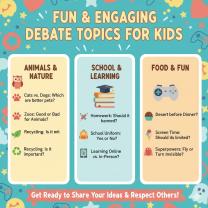Why is reading so important for children?
Reading is one of the most valuable skills children can develop, and its importance goes far beyond learning words on a page. Here’s why it matters so much:
🌟 Benefits of Reading for Children
1. Cognitive Development
Reading strengthens the brain by building connections that support thinking, memory, and problem-solving.
It improves focus, attention span, and the ability to process information.
2. Language & Communication Skills
Expands vocabulary and grammar naturally.
Helps children express themselves more clearly, both in speech and writing.
Encourages curiosity about words and meanings.
3. Academic Success
Children who read regularly perform better in school across all subjects—not just language arts.
Reading builds background knowledge that helps in science, history, and math problem-solving.
4. Imagination & Creativity
Books introduce children to new worlds, ideas, and perspectives.
Imaginative stories fuel creativity, play, and storytelling skills.
5. Emotional & Social Growth
Stories help children understand feelings, empathy, and different life experiences.
Reading together strengthens bonds between children and caregivers.
6. Lifelong Learning & Independence
Encourages curiosity and a love of learning.
Builds confidence as children learn to explore ideas and information on their own.
📚 Tips to Encourage Reading in Children
Start early: Read aloud to children—even babies—to build early interest.
Make it fun: Use silly voices, act out parts, or let them choose books they enjoy.
Create a routine: Set aside daily “reading time” (e.g., before bed).
Lead by example: Let children see adults reading for enjoyment.
Offer variety: Mix storybooks, comics, magazines, and informational books.
Use the library: Give children the freedom to explore and pick their own books.
Celebrate progress: Praise effort, not just achievement, to build confidence.
✅ In short, reading shapes a child’s mind, heart, and future. It opens doors to knowledge, creativity, and empathy—skills that will benefit them for life.
Reading is critically important for children because it lays the foundation for all future academic and personal success.
How does reading impact language development?
Reading exposes children to a wide variety of words and complex sentence structures they wouldn't encounter in everyday conversation.
What cognitive benefits does reading provide?
Reading is a workout for the brain! It promotes several key cognitive benefits, including:
Improved Memory and Concentration: Following a story's plot requires attention and memory, which helps strengthen those neural connections.
Enhanced Imagination and Creativity: Stories transport children to new worlds and expose them to different ideas, fostering curiosity and creative thinking.
Logical Thinking: Understanding a story's plot helps children grasp cause and effect, as well as the sequence of events, which are foundational for logical reasoning and problem-solving.
Emotional Development: Reading stories about different characters and their feelings helps children develop empathy and understand complex emotions.
How can parents encourage a love of reading?
Parents play a vital role in nurturing a love of reading.
Start Early: Begin reading to your child from birth, even if they don't understand the words.
The sound of your voice and the shared experience build a strong emotional bond and a positive association with books. Make it a Routine: Establish a regular time for reading, such as before bedtime. Consistency creates a predictable and comforting routine that your child can look forward to.
Let Them Choose: Allow your child to select books that interest them.
This gives them a sense of ownership and makes reading feel less like a chore. Be a Role Model: Let your children see you reading for pleasure.
Keep books, magazines, and newspapers visible in your home.
What are strategies to improve reading skills in early childhood?
In addition to reading aloud, you can use these strategies to actively improve your child's reading skills:
Dialogic Reading: Make reading a two-way conversation.
Ask open-ended questions about the pictures and the story to encourage critical thinking and understanding. For example, "What do you think will happen next?" Point and Track: As you read, run your finger along the words.
This helps children understand that print corresponds to spoken language and that we read from left to right. Connect to Their World: Relate the story to your child's own life and experiences.
If a book is about a trip to the zoo, talk about your own family's visit. Play Word Games: Engage in activities that focus on the sounds of language, such as singing nursery rhymes, playing rhyming games, or pointing out words that start with the same sound.












